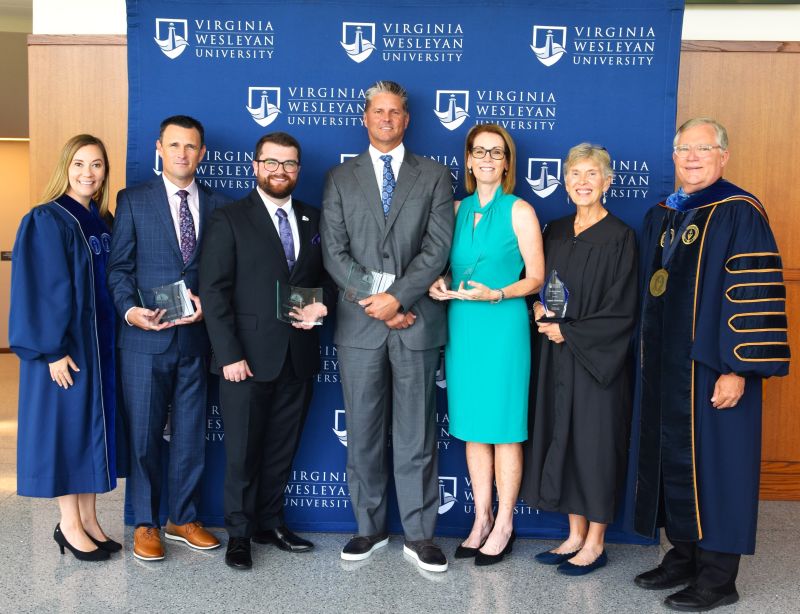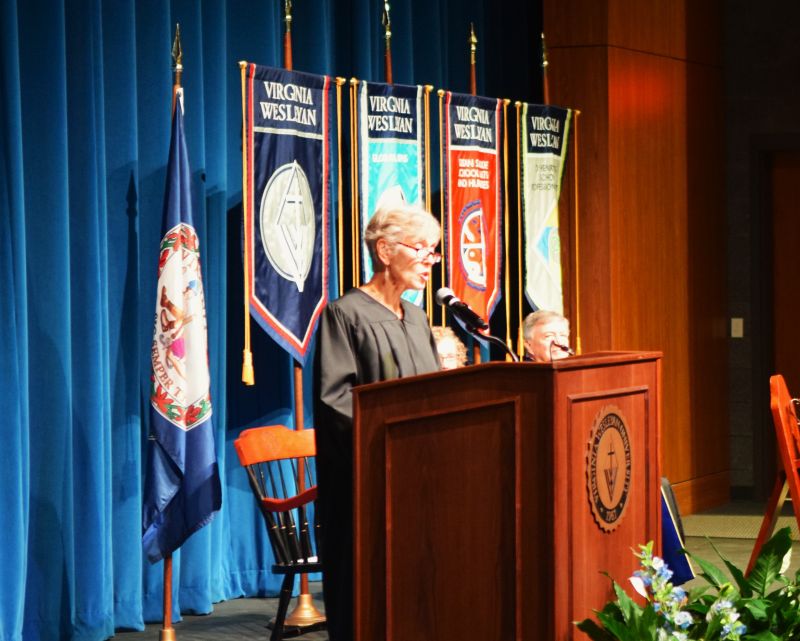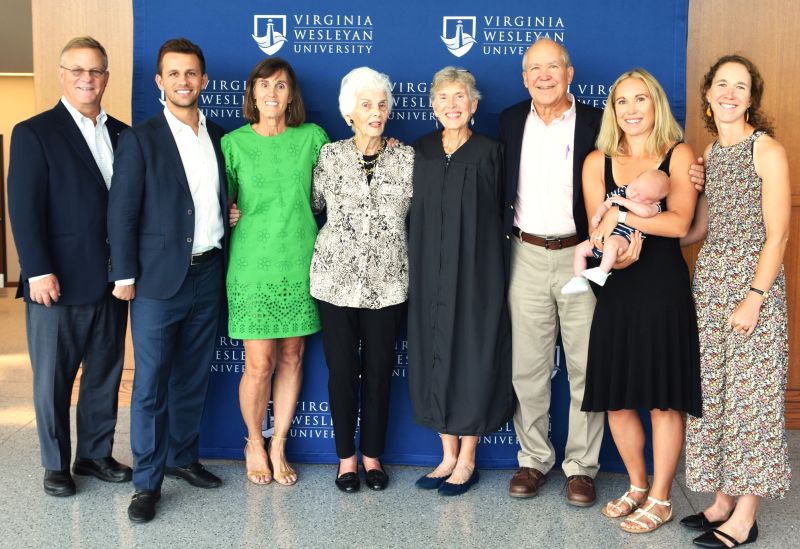Share this Story
Founders Day 2023 Celebrates Virginia Wesleyan’s Rich History
Keynote speaker Leighton Clarke Krips reflected on her father's legacy; Alumni Award recipients honored
University News | September 7, 2023

Krips said she spoke as a representative of the Clarke family as she shared examples of her father’s legacy and the memories and experiences she and her family had of the college’s early years.
During her speech, Krips—whose father was president of Virginia Wesleyan from 1966 to 1992—recalled faculty members and staff who supported her father and left a lasting legacy on campus. She expressed special gratitude for her mother, Alice Clarke, who was in the audience; James Bergdoll, former president Clarke’s assistant and director of development; Dr. Stephen Mansfield, professor emeritus, former dean and author of “Wisdom Lights the Way: Virginia Wesleyan College’s First Half-Century;” and Dr. Larry Hultgren, professor of philosophy who first began his career at VWU 55 years ago. She echoed Dr. Hultgren’s often-used reference to “leaps of faith” made by many at that time in the college’s history.
“There were only 75 students in that first class in the fall of 1966,” noted Krips. “The college was built on 300 acres on a former farm, and there was basically nothing around it. No movie theaters, restaurants, or other entertainment and only three resident students had cars. It was a figurative oasis in a desert. The sense of isolation was acute.”
She talked about how much fun it was for she and her siblings, who ranged in age from 10 to three during their first year at Virginia Wesleyan, to roam the campus and explore classrooms and dorms. She reminisced about her father’s excitement, enthusiasm, and pride, as he took on the important role of building a fledgling college.
“Dad was so proud of the numbers of first-generation college students who were accepted and became successful as students. He had an intense interest in every Virginia Wesleyan student and could remember their names, where they were from, and any particular interests that they had. He loved sharing these facts when he introduced anyone to a student. As my brother Palmore points out, Dad remembered these things because he was genuinely interested in each of them; he did not have to fake an interest in people.”

“My mom would have made a great archivist,” said Krips. “She kept notes in little diaries throughout the years of each and every event my parents hosted, detailing her menus, costs involved, who helped her during the event, and guest lists."
Krips summed up her address with words expressed by her own daughter, Alice.
“The college figured as a canvas for ‘Deedaddy,’ (her grandfather) to embody and develop the tenets and foundations that he held most dear: faith, family, community, and leadership.”
In his remarks, VWU President Scott D. Miller acknowledged the unyielding commitment to education that nurtured both the heart and the mind that was characteristic of John Wesley, the visionary founder of Methodism.
“Amidst the joy and reverence we feel for John Wesley and our earliest founders who laid the foundation of our institution, we also take a moment to acknowledge the passing of former president Billy Greer, who played a pivotal role in shaping our institution's history. His dedication, leadership, and commitment to our community have left an enduring impact, reminding us that our institution's growth is a testament to the collective efforts of those who have guided and nurtured it. In honoring both our founders and Dr. Greer, we find inspiration to continue building upon the ideals they held dear, fostering a community of learning, growth, and unity that will endure for generations to come.”
Following Krips keynote address, President Miller presented her with the 2023 Wesley Award in gratitude for her family’s service, contributions, and support of Virginia Wesleyan for so many years.
Awards Recipients Honored
Dr. Miller and VWU Alumni Council Chair Alisa Crider ’10 then honored the 2023 Alumni Awards recipients during the convocation. Celebrated for their outstanding professional and personal accomplishments, this year's honorees are: Michael R. Rawls ‘91 (Distinguished Alumnus Award), Marie I. Nicolo ‘96 (Alumni Service Award), Nicholas G. Hipple ‘18 (Graduate of the Last Decade Award), and Brandon Elliott ‘03 (Outstanding Service to Alma Mater Award). Each delivered a heartfelt speech detailing their exceptional 
“Recognizing alumni is among the most important traditions at Virginia Wesleyan,” said President Miller. “Our alumni are vital to our continued growth as a national liberal arts institution. We look to our alumni to continue to represent the University and to support and promote our efforts for the future.”
Founders Day was launched in 2016 as an annual event to honor the history and heritage of Virginia Wesleyan.
View the Founders Day Convocation in its entirety on the VWU Digital Broadcasting Network.

